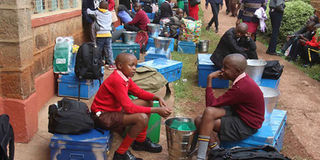Charity will not erase the trail of broken promises

Form One students wait to be admitted to Nyeri High School on January 13, 2020. Thousands of learners have not reported to school due to various reasons, including lack of school fees. PHOTO | JOSEPH KANYI | NATION MEDIA GROUP
What you need to know:
- The government owes our children an apology because quality education should not be negotiable or left to charitable Kenyans.
- Our complacency might have driven them to be so bold as to leave a trail of broken promises.
The girl’s relief upon receiving financial help that will secure her future in education is palpable.
You can feel it even through the television screen. Let’s call her Nereah. Her clothes and demeanour speak of only one thing: despair.
Her story is painfully familiar. Nereah received an invitation from the school of her dreams, but the only way her parents could afford the school fees is if they gave up their own lives.
It was mission impossible. She knew the only way she could secure her future in education would be to lose the soles of her feet by walking hundreds of kilometres to the school her dreams were made of.
This way, she would attract the sympathy of the headteacher, teachers, alumni and the media.
She knew that media attention was the ticket to her dreams of becoming a doctor or another white-collar profession.
Sufficiently benevolent Kenyans, school alumni or politicians (or their wives), who wrote a cheque that would pay for a whole year’s school fees, stand next to her for the “Kodak moments”, happy that they have played a role in building her future.
SUSTAINABLE APPROACH
The irony is that there has never been a more fitting example of broken promises about education for our children.
Why should they have to beg for their right to education? In the words of climate change hero Greta Thunberg, the government has stolen Nereah’s dreams and her childhood with empty words.
And we are complicit in this because we have failed them by electing rogue leaders who eat their future for lunch.
It’s a given that financial assistance to pay school fees is a noble act that deserves applause on any given day, but history has shown us that help is sometimes a four-letter word.
And that harambees can be a curse. For there’s nothing progressive or sustainable about securing the future of a few hundred children while the fate of millions hangs in the balance.
The truth is that the government owes our children an apology because quality education should not be negotiable or left to charitable Kenyans.
FAILED PROJECTS
Noble as they may be, the charitable acts reveal that the children’s future in education remains at stake.
Not just for the horrific typos in the Competency-Based Curriculum (CBC) books but also for the manner in which it has been shoved down the throats of parents, teachers and children, making them helpless slaves to its demands.
Let’s face it. There’s something sinister about the 2-6-6-3 CBC. Former Education Cabinet Secretary Amina Mohamed, before she changed tune, pointed out that the country was not ready for CBC because of the gaps in resources and teacher training, but did we listen?
It’s not surprising, therefore, that the rollout of the curriculum has been marred by controversy and more questions than answers.
Speaking of more questions than answers, what happened to the laptop project?
Granted, the government does not have a stellar record of keeping promises, and our complacency might have driven them to be so bold as to leave a trail of broken promises. But the question is still worth asking, for the sake of children like Nereah.
FREE EDUCATION
The fallacy that’s also the elephant in the room is the 100 per cent transition from primary to secondary school by providing free education in all public primary and day secondary schools, which was part of the Jubilee Party’s manifesto.
This unfulfilled (or poorly delivered) promise is probably what got Nereah into a quagmire in the first place.
That’s why her story, the one about walking to school with nothing but her metal box, tattered clothes and endless hope, will be told again and again.
In short, the number of benevolent acts we are willing to commit to won’t count for anything unless we demand answers to the hard questions about the broken promises about quality education.
Ms Oneya comments on social issues. Twitter: @FaithOneya; e-mail: [email protected]





